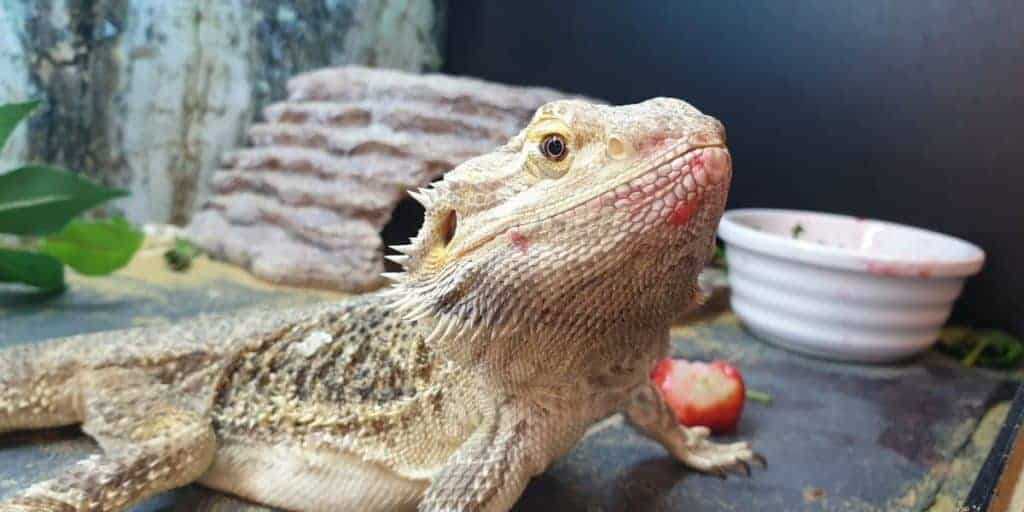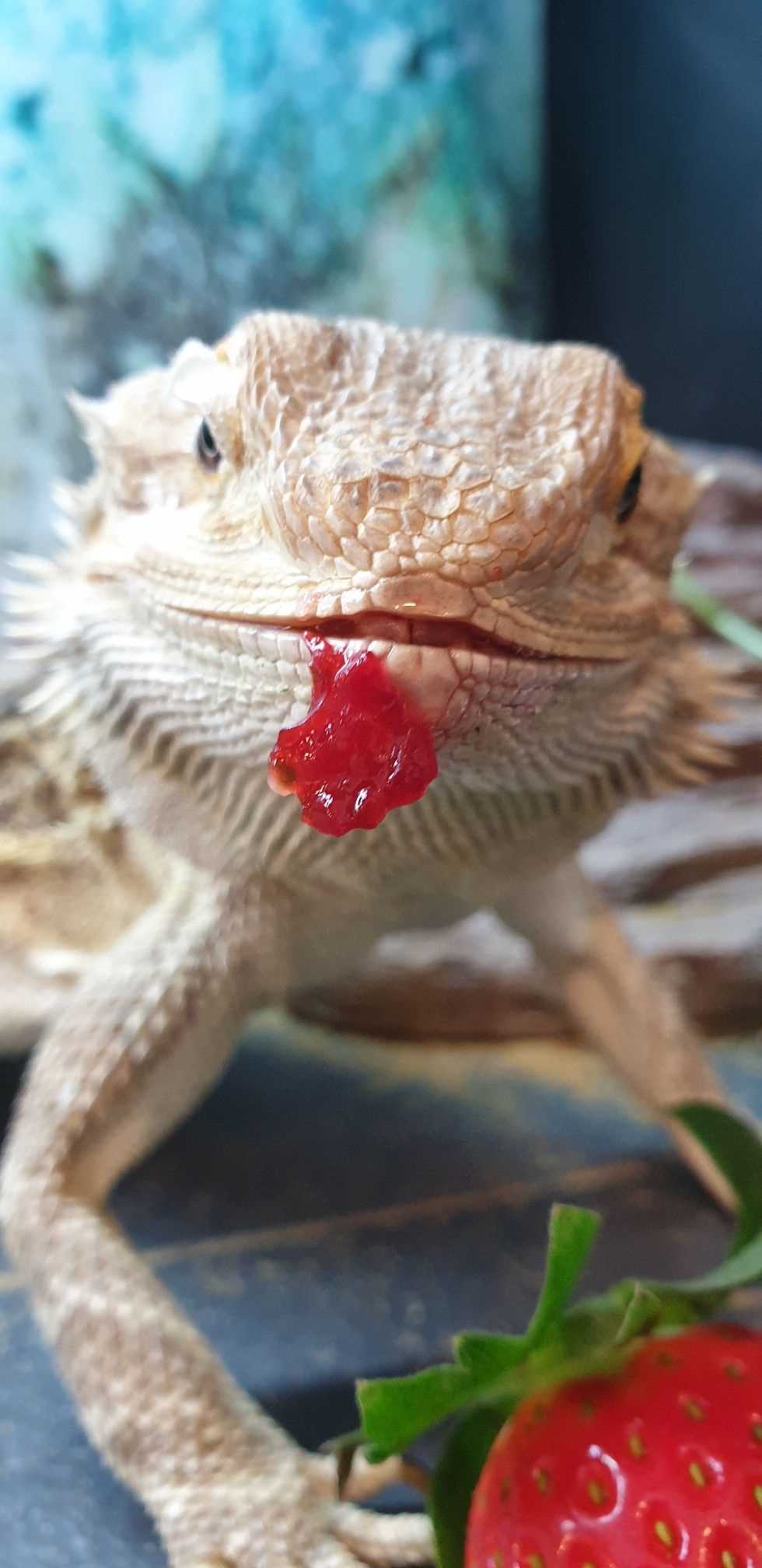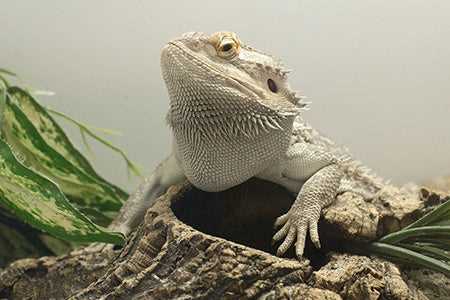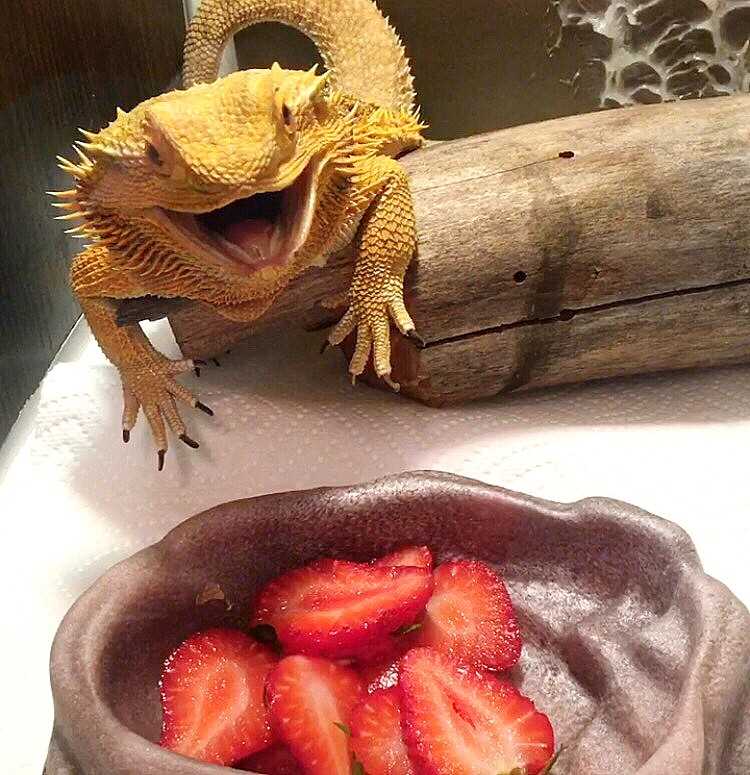
The bearded dragon (Pogona vitticeps) is a popular pet reptile known for its distinctive scaly appearance and friendly personality. These lizards are native to the arid regions of Australia and are omnivorous by nature, meaning they eat both plants and animals.
Physical Characteristics
Bearded dragons are medium-sized lizards, typically measuring around 18 to 24 inches in length. They have a triangular-shaped head and a flat body covered in rough scales. These reptiles come in various colors, including shades of brown, tan, yellow, and even red. One interesting feature of bearded dragons is their ability to change their color to regulate their body temperature or express their mood.
Natural Habitat
Diet and Feeding Habits

Bearded dragons are omnivorous, meaning they eat a combination of plant matter and animal protein. Their diet primarily consists of insects, such as crickets, mealworms, and Dubia roaches. These reptiles also enjoy a variety of fruits and vegetables, including leafy greens, squash, berries, and yes, even strawberries.
Benefits of Eating Strawberries
Strawberries are a rich source of vitamins, minerals, and antioxidants, making them a healthy treat for bearded dragons. They are packed with vitamin C, which helps boost the immune system and promote overall health. The high water content in strawberries can also contribute to the hydration of these lizards, especially in dry environments. Additionally, the natural sugars present in strawberries can provide a quick source of energy for bearded dragons.
| Key Points: |
|---|
| Bearded dragons are medium-sized lizards native to Australia. |
| They have a unique appearance with a “beard” of spiky scales under their chin. |
| Bearded dragons can change their color and are well-adapted to harsh environments. |
| Their diet consists of insects, fruits, vegetables, and even strawberries. |
| Strawberries provide vitamins, hydration, and energy for bearded dragons. |
Caring for Bearded Dragons
When feeding strawberries to your bearded dragon, it is essential to ensure that they are thoroughly washed and cut into small, bite-sized pieces. This helps to prevent any choking hazards and makes it easier for your dragon to consume. It is also important to only offer ripe and fresh strawberries, as spoiled or moldy strawberries can be harmful to your pet.
In addition to providing a balanced diet, proper hydration is also crucial for the health of your bearded dragon. Ensure that your pet has access to fresh, clean water at all times. You can also mist their enclosure with water to increase humidity, as bearded dragons require a certain level of humidity to maintain their overall health.
Feeding Bearded Dragons
Feeding bearded dragons is an important aspect of their care and overall well-being. These reptiles have specific dietary requirements, and offering them a variety of foods is crucial for their health. One food that you may consider adding to your bearded dragon’s diet is strawberries.
The Benefits of Offering Strawberries

Strawberries are a delicious and nutritious treat that bearded dragons can enjoy. These small fruits are rich in vitamins and minerals that can contribute to the overall health of your pet dragon. They are an excellent source of vitamin C, which boosts the immune system and helps prevent diseases. Additionally, strawberries contain antioxidants that can help combat inflammation and promote a healthy heart.
Furthermore, strawberries are a great source of hydration for bearded dragons. These reptiles typically obtain most of their water from the food they eat. The high water content of strawberries can help keep your dragon properly hydrated and support their overall hydration needs.
Introducing Strawberries into the Diet
It’s also essential to wash the strawberries thoroughly before feeding them to your dragon. Remove any stems or leaves, and make sure they are free from pesticides or other harmful substances. Organic strawberries are the best option to ensure your dragon’s safety.
Frequency of Feeding Strawberries
While strawberries can be a healthy addition to your bearded dragon’s diet, it’s essential to offer them in moderation. These fruits are high in natural sugars, and excessive consumption can lead to weight gain and other health issues. Limit the amount of strawberries you offer to your dragon to once or twice a week, and make sure to provide a balanced diet of other vegetables, insects, and leafy greens as well.
Conclusion
Feeding bearded dragons a varied and nutritious diet is essential for their overall health and well-being. Introducing strawberries as a treat can provide them with important vitamins, minerals, and hydration. However, it’s crucial to offer strawberries in moderation and ensure they are properly washed and free from harmful substances. By following these guidelines, you can safely incorporate strawberries into your dragon’s diet and promote their optimal health.
Benefits of Feeding Strawberries to Bearded Dragons
Bearded dragons are omnivorous reptiles and require a diverse diet to stay healthy and thrive. While their primary diet consists of insects and leafy greens, incorporating fruits into their meals can provide a range of benefits. One fruit that can be particularly beneficial for bearded dragons is strawberries.
Strawberries are a rich source of essential nutrients that can support the overall health of bearded dragons. They contain vitamins such as vitamin C, which is crucial for their immune system and helps protect them against diseases. Additionally, strawberries are low in fat and high in fiber, making them a suitable treat for bearded dragons.
Another advantage of feeding strawberries to bearded dragons is their high water content. Hydration is essential for these reptiles, and offering them fruits like strawberries can help ensure they stay properly hydrated. The juicy nature of strawberries can also make them desirable for bearded dragons, encouraging them to eat and maintain a healthy appetite.
In addition to being nutritious, strawberries can also provide mental stimulation and enrichment for bearded dragons. The vibrant red color and sweet smell of strawberries can pique their interest and make mealtime more exciting. Introducing a variety of flavors and textures to their diet can prevent boredom and mimic their natural foraging behavior in the wild.
When feeding strawberries to bearded dragons, it is essential to do so in moderation. While strawberries offer nutritional benefits, they are also high in natural sugars. Excessive consumption of sugary fruits can lead to weight gain and other health issues for bearded dragons. Therefore, strawberries should be offered as an occasional treat rather than a staple part of their diet.
| Benefits of Feeding Strawberries to Bearded Dragons: |
|---|
| – Source of essential nutrients |
| – High in water content for hydration |
| – Provides mental stimulation and enrichment |
| – Should be fed in moderation |
Precautions and Risks
While bearded dragons can enjoy the occasional strawberry treat, there are some important precautions and risks to consider.
Digestive Issues:
Bearded dragons have sensitive digestive systems, and strawberries, as well as other fruits, can potentially cause digestive issues. The high sugar content in strawberries can lead to an upset stomach, diarrhea, or even bloating in bearded dragons. It is essential to introduce strawberries slowly and in small quantities to monitor their reaction.
Pesticides:

When feeding strawberries or any other fruits or vegetables to your bearded dragon, it is crucial to ensure that the produce is organic or pesticide-free. Conventionally grown strawberries can contain harmful pesticides that can be toxic to your reptile friend. Always wash the strawberries thoroughly before feeding them to remove any potential residues.
Allergic Reactions:
While rare, some bearded dragons may have allergies or sensitivities to strawberries. If your pet starts showing signs of an allergic reaction, such as swelling, breathing difficulties, or skin irritations, it is crucial to discontinue feeding them strawberries immediately and consult a veterinarian.
Choking Hazard:
Tips for Feeding Bearded Dragons Strawberries
1. Introduce strawberries gradually:
When feeding strawberries to your bearded dragon for the first time, start with a small amount and observe their reaction. It is essential to introduce new foods slowly to avoid digestive issues.
2. Wash the strawberries:
Before offering strawberries to your bearded dragon, make sure to wash them thoroughly. Remove any dirt or pesticides by rinsing the fruit under running water.
3. Remove the stem and leaves:
Bearded dragons have difficulty digesting tough or fibrous parts of fruits, including the stems and leaves. Remove them before serving strawberries to your pet to prevent any digestive problems.
4. Cut the strawberries into small pieces:
Bearded dragons have smaller mouths and may struggle to eat large chunks of strawberries. To make it easier for them to consume, cut the strawberries into small, bite-sized pieces. This will also help prevent choking hazards.
5. Feed strawberries as an occasional treat:
While strawberries are safe for bearded dragons to eat, they should not be a regular part of their diet. Strawberries are high in natural sugars and should be fed in moderation, as excessive sugar intake can lead to health issues in reptiles.
6. Monitor your bearded dragon’s reaction:
After feeding strawberries to your bearded dragon, observe their behavior and digestive health. If you notice any negative reactions, such as diarrhea or lethargy, discontinue feeding strawberries and consult a veterinarian if necessary.
7. Offer a varied diet:
While strawberries can be a tasty treat, it is crucial to offer a balanced and varied diet to your bearded dragon. Make sure to include a mix of insects, vegetables, and other fruits to ensure they receive all the necessary nutrients.
By following these tips, you can safely incorporate strawberries into your bearded dragon’s diet and provide them with a delicious and nutritious snack!

I’m Lena Adams—a product of an unconventional upbringing in the African wilderness. My father, a daring explorer of African wildlife, sparked my fascination with reptiles, a passion that intertwined with the tragic loss of my mother during an expedition, leaving an indelible mark on my life. Driven to understand the creatures that captivated my parents, I embarked on my journey, sharing insights about reptiles, frogs, and lizards on my website. Through my explorations and conservation efforts, I honour my family’s legacy while seeking connections—to the creatures, nature, and the mother whose presence I yearn to understand.
